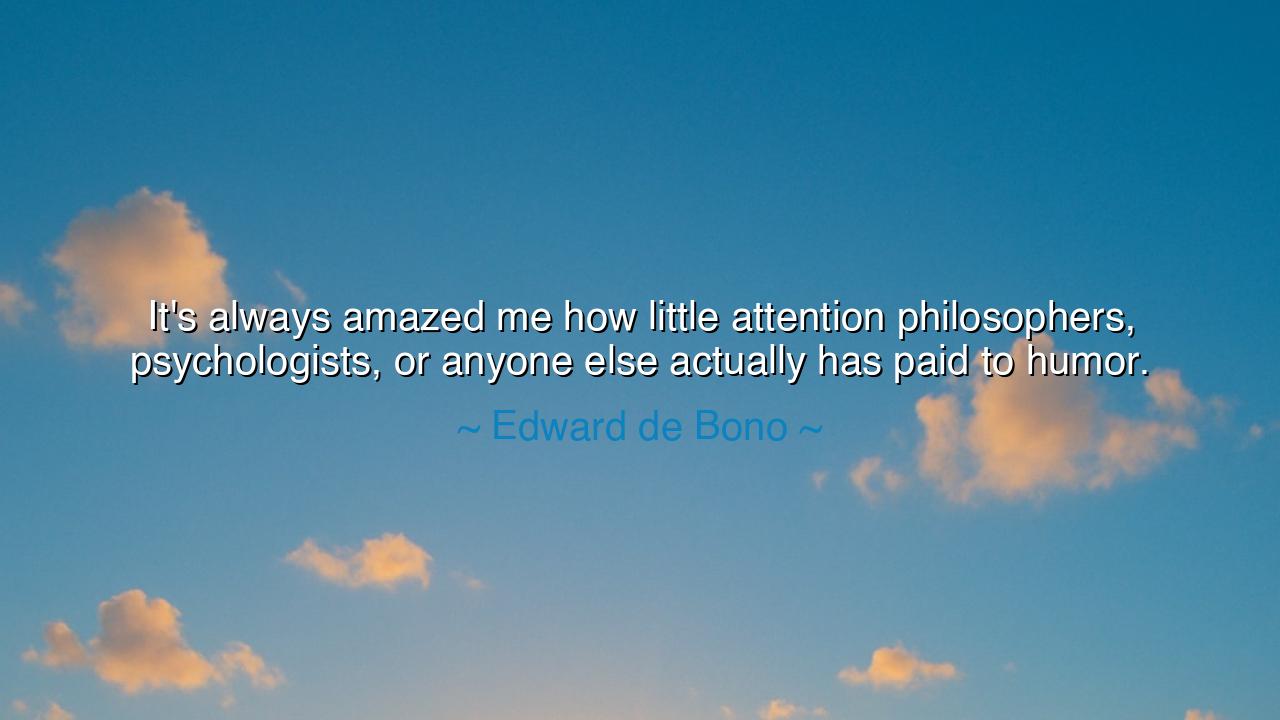
It's always amazed me how little attention philosophers
It's always amazed me how little attention philosophers, psychologists, or anyone else actually has paid to humor.






Hear the words of Edward de Bono, the master of creative thought, who once declared: “It’s always amazed me how little attention philosophers, psychologists, or anyone else actually has paid to humor.” These words, though calm in tone, carry the quiet force of revelation. For in them lies a challenge to centuries of human thought—a reminder that while we have studied reason, morality, and the nature of existence, we have too often neglected one of life’s most profound teachers: laughter. De Bono, whose work sought to free the human mind from rigid patterns, saw humor not as a distraction from wisdom but as one of its purest forms.
From the dawn of civilization, mankind has sought to understand the great mysteries of life—truth, virtue, love, and death. The philosophers of Greece debated what it means to live well; the psychologists of later ages analyzed the depths of the soul. Yet few, as De Bono observed, turned their gaze to the mystery of laughter. They treated humor as a trifle, a childish pleasure unworthy of study, forgetting that in laughter lies the spark of insight. For to laugh is to see suddenly from a new angle, to overturn expectation, to discover the hidden link between opposites. It is, as De Bono taught, the very essence of creative thinking—the mind’s dance between the known and the unknown.
The ancients themselves understood fragments of this truth, though they did not always name it. The philosopher Socrates often spoke through irony, using humor as a blade sharper than logic. By pretending ignorance, he made the proud reveal their own folly. And the Stoics, who taught that man must master emotion, were not strangers to laughter; they saw it as a sign of balance, of the wise man’s ability to observe life without being enslaved by it. Yet even these great thinkers rarely paused to ask why laughter heals, enlightens, and unites. They studied tragedy to understand suffering, but they forgot to study comedy to understand resilience.
Consider, too, the life of Abraham Lincoln, a man burdened by war, doubt, and the sorrow of leadership. Yet even in the darkest days of the Civil War, he was known for his humor. His jokes were not mere distractions—they were acts of survival. “If I did not laugh,” he said, “I should die.” His laughter was not the laughter of ignorance, but of wisdom—a recognition that life’s weight can only be borne when the heart remembers to be light. Lincoln’s humor did not diminish his greatness; it deepened it. Through it, he found the strength to lead a broken people toward healing. This, too, is what De Bono saw: that humor is not opposed to wisdom—it is wisdom in motion.
The origin of De Bono’s insight lies in his study of creative thinking. He saw that the mind too easily becomes trapped in patterns, repeating the same ideas, seeing the world through narrow frames. But humor, he said, disrupts these patterns. A joke surprises us, forces the mind to leap sideways, to see differently. It opens new pathways of thought and understanding. In this way, laughter becomes a tool of genius. The comedian, like the philosopher, reveals hidden truths—only he does so through joy rather than solemnity. To ignore humor, therefore, is to ignore one of the mind’s greatest powers: the power to transform.
We can see now why De Bono found it “amazing” that so few had studied humor. For humor is not merely the play of words—it is the play of perception. It shows us that life itself is filled with paradoxes: pain that leads to joy, folly that reveals wisdom, endings that give birth to beginnings. When we laugh, we acknowledge these contradictions and accept them. Laughter humbles the intellect but enriches the soul. The man who cannot laugh, no matter how learned, is blind to half the truth of existence.
Let this, then, be the teaching passed down to all who seek understanding: honor humor as a form of wisdom. When you are faced with hardship, find the spark of laughter hidden within it—it will teach you courage. When you are locked in argument, learn to smile—it will teach you humility. When your mind grows rigid with certainty, seek the company of laughter—it will remind you that truth is vast and flexible. The one who can laugh freely can think freely, and the one who thinks freely can live fully.
Thus remember the wisdom of Edward de Bono: in neglecting humor, we neglect one of the highest expressions of intelligence. Philosophy gives us reason, psychology gives us depth, but humor gives us freedom. Let your laughter be not shallow mockery, but the deep, knowing laughter of the awakened soul—the laughter that says, “I understand life, and I love it still.” For when mankind learns to study humor as earnestly as it studies sorrow, it will find not only knowledge, but peace.






AAdministratorAdministrator
Welcome, honored guests. Please leave a comment, we will respond soon